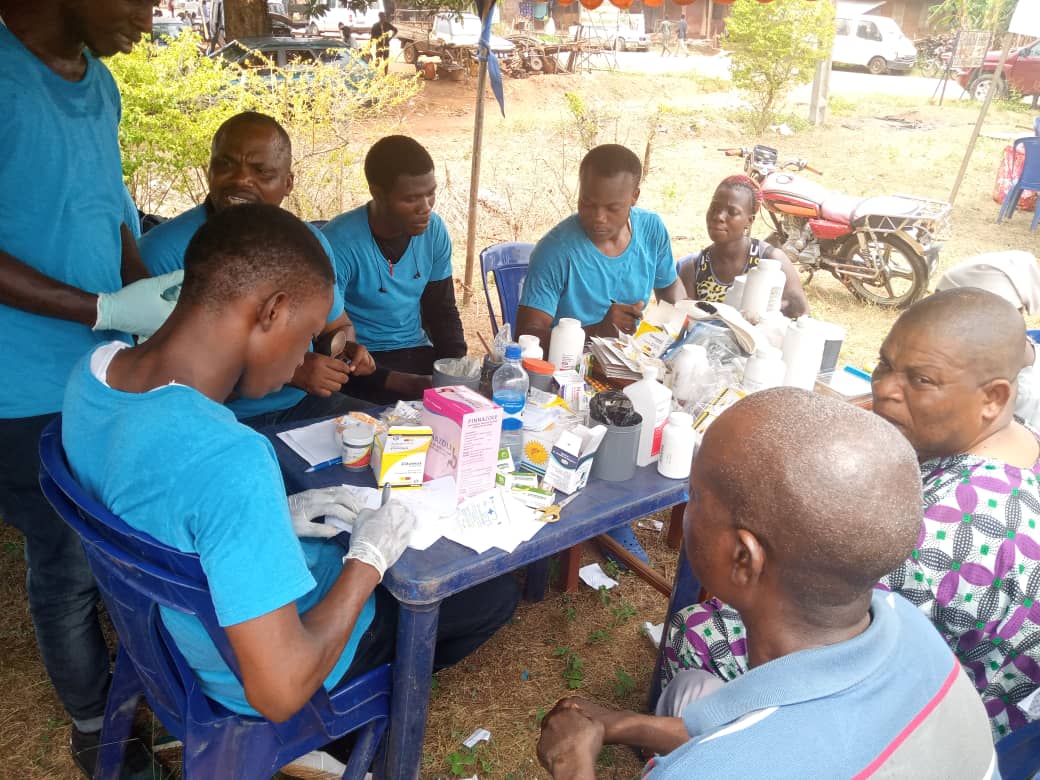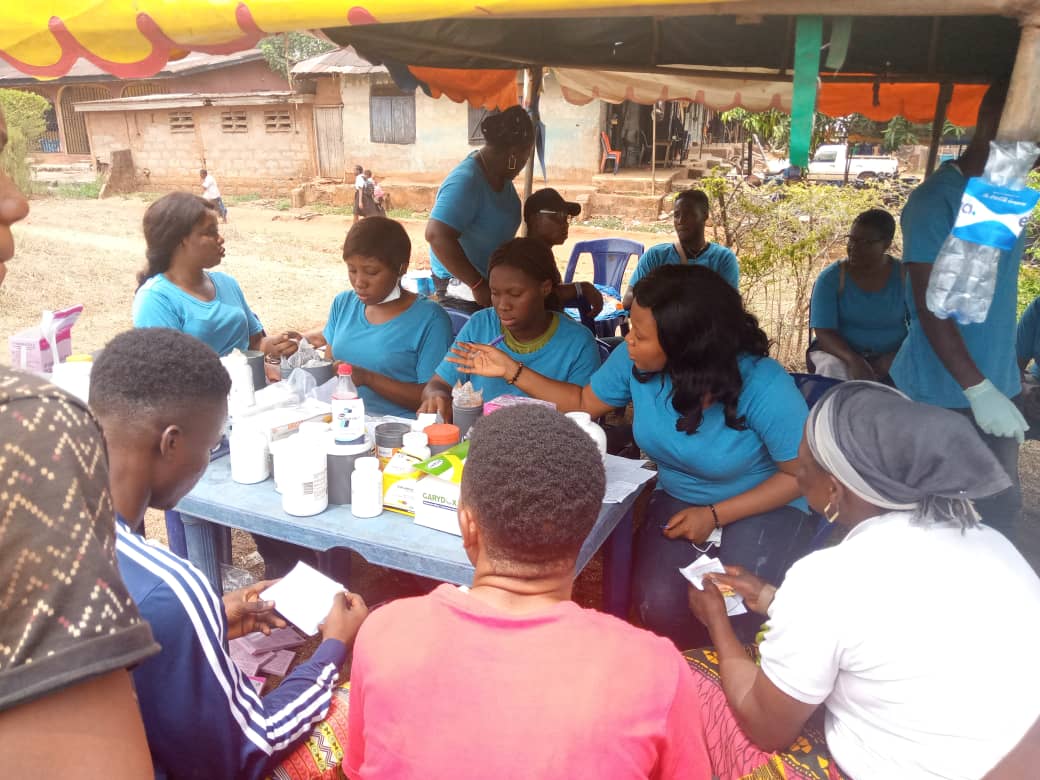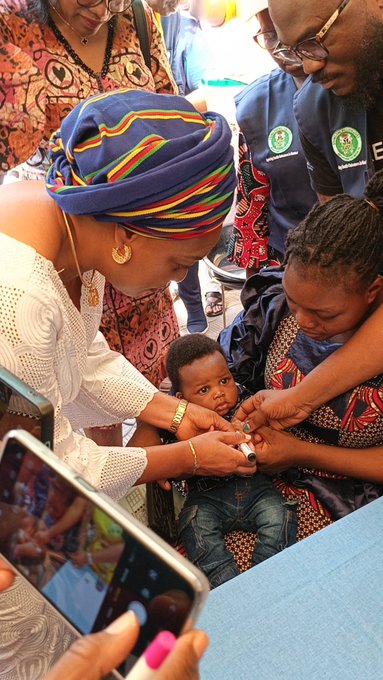Health
‘Over 300 Benefit From Our Medical Mission In Urhonigbe’ – ENAW
Published
5 years agoon
By
Editor
As part of it humanitarian effort to make sure that Edo people at home get the needed medical treatment and attention, Edo National Association Worldwide (ENAW), have provided medical treatment, drugs and proteinious items like beans to indigenes of Urhonigbe community, Orhionmwon Local Area of Edo State.
The indigenes who troop out in large number made golden use of the opportunity provided by ENAW who left no stone unturned as various medical practitioners from the visiting team made it a duty to everyone from the community who were on ground.
Speaking to newsmen at Urhonigbe health centre, venue of the medical mission, Mercy Grant said they were in Urhonigbe as part of their annual humanitarian activities which is a way of remembering those at home who may not have the means of accessing medical treatment or check up.
READ ALSO: The animal called dino
According to her, “we decided to come here as part of what we do. We were here 2018 and this year 2020 we are here again to give medical advice, prescription, brushes for tooth, eye glasses and offer treatment to our people in this community. You can see, we have attended to over three hundred persons today.
“Normally, when we come for ENAW medical mission like this, we cover every village/community in Edo State, reason being that, the Association is a body that house every Edo son and daughter living in Canada and the United States of America. We put this together for the betterment of our people living home here in Edo State Nigeria and today it is the turn of Urhonigbe community which is hosted by one of our member who is the president of Urhonigbe Association of Nigeria, Mr Charles Odiase.”

A cross section of medical team attending to the indigenes of the community
Some beneficiaries who testify of the gesture from the ENAW, said they were very happy to benefit from the Association’s free medical treatment and free drugs, saying the last time they visited was what while.
READ ALSO: Sustainable Development Cannot Be Achieved Where Gender Bias Thrive – Don
“My brother, we are here because we benefited positively from the last outreach by the body and that is why we are also here today. We were very happy when we got the information that they were coming and today own is not just treatment, they are also giving us beans and other items that will be healthy for us”, they said.
Earlier, Mr Odiase said the medical mission became very necessary owning to the fact that some people living in the agrarian community are faced with challenges of all kinds.
READ ALSO: 10 Sustaina Injuries As Fracas Mars PDP Ward Congress In Delta Community
Mr Odiase noted that Urhonigbe, being an integra part of the state will always benefit from the humanitarian gesture of the association at all time.
Send Us Press Releases Via editor@infodailyng.com. For Your Interview And Your Event Coverage Call Or Chat 08067027581
You may like
Health
LASG FLags Off Polio Outbreak Response Campaign
Published
6 months agoon
January 20, 2025By
Editor
The Lagos State Government, through the Lagos State Primary Health Care Board, has launched the 2025 Polio Outbreak Response Campaign, reaffirming its commitment to eradicating polio and safeguarding the health of its children.
The ceremony, held at the Simpson Primary Healthcare Centre, was led by the First Lady of Lagos State, Dr. (Mrs.) Claudiana Ibijoke Sanwo-Olu, represented by Mrs. Widad Jumoke Mustafa, a member of the Committee of Wives of Lagos State Officials (COWLSO).
In her address, the First Lady emphasised the state government’s proactive measures to keep Lagos polio-free, highlighting the critical importance of the campaign in preventing the debilitating effects of poliomyelitis, which can result in paralysis or death.
READ ALSO: IMPEACHMENT: Lagos Ex-Speaker, Obasa’s ‘Sins’ Revealed
The First Lady also called on parents, community leaders, and stakeholders to support the campaign by ensuring eligible children are vaccinated.
Targeting children aged 0-59 months, vaccination teams will administer the Oral Polio Vaccine (OPV) to prevent virus transmission.
Dr. Kemi Ogunyemi, the Special Adviser on Health, expressed gratitude to Lagosians for their continued cooperation in the fight against polio. While appreciating all healthcare workers and partners for their services, Mrs. Ogunyemi encouraged parents to present their children and wards for the exercise.
Also speaking, the Chairman of Lagos Mainland Local Government, Mrs. Omolola Rashidat Essien opined that Immunization is key in ensuring that children are kept safe from polio and other vaccine preventable diseases.
Dr. Abimbola Bowale, the Supervising Permanent Secretary, Lagos State Primary Health Care Board, who also spoke at the event, underscored the life-saving importance of immunization.
“All children aged 0-59 months need multiple doses of the polio vaccine to ensure full protection. Any child missed represents a potential risk for the poliovirus to spread. The vaccine is safe, effective, and crucial in keeping our communities polio-free,” he stated.
Dr. Bowale also outlined several strategies to ensure the success of the campaign, including fixed post teams stationed at primary healthcare centres and public health facilities, house-to-house visits, and a transit strategy to reach special locations such as places of worship, schools, motor parks, and other public venues.
The event concluded with Dr. (Mrs.) Claudiana Ibijoke Sanwo-Olu officially launched the campaign, marking a renewed effort to maintain Lagos State’s polio-free status.

The Lagos state suspected cholera cases have risen to 421.
The Commissioner for Health, Akin Abayomi disclosed this on his Instagram handle @profakinabayomi on Saturday.
“As of June 20, 2024, an additional four suspected cholera cases have been reported, as illustrated in the accompanying graph,” he wrote.
He noted that the Emergency Operations Centre in collaboration with all relevant partners is actively engaged in contact tracing, community-based surveillance, awareness campaigns, sample testing, and ensuring that confirmed cholera cases receive appropriate medical treatment.
READ ALSO: Two Suspects Arrested For Stealing Car From Mosque During Juma’at Prayer
On Friday, the commissioner confirmed 35 cases out of the 417 suspected cases and 24 deaths across 20 Local Government Areas in the state.
The cases were reported from Agege, Badagry, Ikeja, Mushin, Ajeromi-Ifelofun, Epe, Ikorodu, Ojo, Alimosho, and Eti-Osa.
Others were Kosofe, Oshodi-Isolo, Amuwo-Odofin, Ibeju-Lekki, Lagos Island, Shomolu, Apapa, Ifako-Ijaiye, Lagos mainland, and Surulere.
Cholera is a food and water-borne disease caused by ingesting the bacteria— Vibrio cholerae — in contaminated water and food. Cholera can cause severe acute watery diarrhoea, and the severe forms of the disease can kill within hours if left untreated.
In Nigeria, cholera is an endemic and seasonal disease, occurring annually mostly during the rainy season and more frequently in areas with poor sanitation.
READ ALSO: Police Arrest 28yr Old Suspected Cultists, Recover Gun In Delta Community
The World Health Organisation on Thursday announced a spike in cholera in several regions of the world, with almost 195,000 cases and over 1,900 deaths reported in 24 countries since the start of 2024.
WHO said the Eastern Mediterranean Region reported the highest number of cases, followed by the African Region, the Region of the Americas, the Southeast Asia Region, and the European Region.
The global health body, however, noted that there are no reported cases in the Western Region, according to its bulletin released on Wednesday.
It said it exhausted its global stockpile of Oral Cholera Vaccines by March but was able to exceed “the emergency target of five million doses in early June for the first time in 2024.”

By Silver Yeibake
Autism, commonly known as Autism Spectrum Disorder (ASD), is a neurodevelopmental disorder that affects communication, social interaction, and behavior. Autism is referred to as a spectrum condition since it can manifest in a variety of symptoms and abilities. While the actual cause of autism is unknown, evidence suggests that genetic and environmental factors interact to influence its development.
The risk factors include a sibling with autism, advanced age of parents, exposure to certain air pollutants and pesticides before birth, extreme prematurity, mothers with diabetes, immune system disorders or obesity, any difficulty with delivery leading to deprivation of oxygen to the baby’s brain, fever during pregnancy, lack of certain vitamins minerals during pregnancy, and certain genetic conditions, such as Down, fragile X, and Rett syndromes.
“Risk factors can not on their own cause a disease. However, they can increase the likelihood of that disease in a person.”
It is important to know that contrary to trending claims online, there is no scientific or medical evidence that vaccines or consumption of sugar are risk factors for autism.
READ ALSO: Kidney Stones: What You Need To Know
Autism is defined by difficulties in social interaction and communication. Individuals with autism may struggle to grasp social cues, maintain eye contact, and engage in typical back-and-forth conversations. Some people may also engage in meaningless, repetitive actions, such as hand-flapping or rocking, and have strong interests in specific areas.
It is essential to remember that autism is a lifelong diagnosis, but with early intervention and adequate care, people with autism can live fulfilling lives.
Autism treatment frequently includes behavioral therapy, speech therapy, occupational therapy, and social skills training. Each individual with autism is unique, thus interventions should be tailored to meet their personal needs and strengths.
In spite of the difficulties that autism can cause, many people with autism possess unique talents and abilities. Some people may succeed in fields such as music, art, mathematics, or programming, thus it is important for society to acknowledge and honor the qualities and achievements of people with autism.
In summary, autism is a complicated and diverse disorder that affects individuals in various ways. By raising autism knowledge, understanding, and acceptance, we can build a more inclusive society in which people with autism can thrive and attain their full potential.
Dr. Yeibake, Weriwoyingipre Silver.
Senior Registrar,
Faculty Of Pediatrics,
WACP
- NAFDAC Warns On Recalled U.S. Supplements
- Protest Rocks Abuja Over Osun LG Polls
- ADC Unveiled In Benue, Woo Gov Alia
- FG Launches Phase 7 Of Kainji Mass Trials Of Terrorist Suspects
- Lagos LG Poll: Police Restrict Movement Saturday
- EFCC Probes Man Nabbed With Undeclared $420,900 At Kano Airport
- Driver Stabs Former Boss To Death In Lagos
- Police Arrest Cultist For Murder, Abduction In Anambra Community
- Police Unveil Operation To Tackle ‘One-chance’ Robberies In FCT
- Pregnant UNIPORT Student Nabbed For Torching Lover To Death
About Us
Trending

 Entertainment4 days ago
Entertainment4 days ago2Baba’s New Romance In Trouble As Natasha Fumes Over Loyalty Remark

 Politics5 days ago
Politics5 days agoCoalition: Why Tinubu Must Not Sleep —Primate Ayodele

 News2 days ago
News2 days agoBREAKING: FG Officially Releases Age Limit For Admission Into Tertiary Institutions

 Metro4 days ago
Metro4 days agoTragedy As Navy Boat Capsizes After Free Medical Outreach In Delta

 News2 days ago
News2 days agoFlash Flood Warning: Sokoto, Edo, Akwa Ibom, 17 Other States At Risk In July — NiMet

 News2 days ago
News2 days agoOPINION: APC’s Leprosy Versus ADC’s Scabies

 Politics3 days ago
Politics3 days ago2027: Peter Obi Speaks On Running For President, Deal With Atiku

 Politics4 days ago
Politics4 days agoJUST IN] 2027: South-South APC Endorses Tinubu, Four Govs For Re-election

 News4 days ago
News4 days agoNigeria Becoming Land Flowing With Tears And Blood — Anglican Bishop Of Warri Laments

 Metro5 days ago
Metro5 days agoCultism: Edo Police Arrest Suspected Killer Of Three Vigilantes, 15 Others















